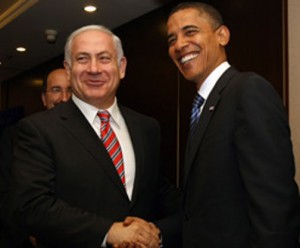Wednesday
Jul072010
Israel-US Analysis: Netanyahu Wins --- 1, 2, 3, 4 Times --- in Talks With Obama (Yenidunya)
 Wednesday, July 7, 2010 at 13:35
Wednesday, July 7, 2010 at 13:35  Finally, Israeli Prime Minister Benjamin Netanyahu has had his meeting with Barack Obama, an encounter described by the US President as "excellent".
Finally, Israeli Prime Minister Benjamin Netanyahu has had his meeting with Barack Obama, an encounter described by the US President as "excellent".Both leaders pointed to four main topics in their private talks, but the most striking note in Obama's speech was his emphasis on "Israel's security", mentioned eight times, crowned by "the U.S.'s unwavering commitment to Israel's security" and an underlining of the "unbreakable bonds" between two countries.
Palestine Analysis: Assessing Direct Talks between Israel & the Palestinian Authority
Israel Video & Transcript: The Netanyahu-Obama Meeting (6 July)
First of all, there was Gaza. Obama did not criticise Israel's misconduct over the clash with the Freedom Flotilla. He did not mention West Jerusalem's pursuit of an internal enquiry, defying calls for an impartial, international investigation. But he did praise Israel's "real progress" with the widening of the list of goods permitted entry into Gaza.
Secondly, the "Iranian threat". Both leaders praised national and international sanctions. Then, Netanyahu added the title "the biggest threat" to Tehran and called on all those in the United Nations to increase the effectiveness of the sanctions, especially on the energy sector.
Thirdly, Israel's nuclear arsenals. Although nearly 200 signatories of the Nuclear Non-Proliferation Treaty (NPT), including the US, agreed in May to work towards a nuclear-weapons-free zone in the Middle East, Obama stated that there is no change in U.S. policy on West Jerusalem's officially undeclared stockpile of nuclear arms: "Israel has unique security requirements!"
Lastly, the talks with the Palestinian Authority. Obama's agenda is crystal-clear: both sides will present confidence-building measures. Included in this is a messsage to the Palestinians not to make any demand for a freeze on construction of Israeli settlements in the West Bank, as this will lead to "more room created by more trust".
Then, the parties will move to direct talks. The precedent has been set by this week's meetingin Jerusalem between Israeli Defense Minister Ehud Barak and the Palestinian Authority's Salam Fayyad. In that meeting, Fayyad asked for more space and duties for a Palestinian security force, consolidating the Palestinian Authority's legitimacy. Obama offered support:
Abu Mazen [Palestinian Authority leader Mahmoud Abbas], working with Fayyad, has done some very significant things when it comes to the security front. And so us being able to widen the scope of their responsibilities in the West Bank is something that I think would be very meaningful to the Palestinian people.
Obama, when asked if there would be an extension of the construction freeze in the West Bank, merely stated that parties should engage in direct talks so that they can trust each other through confidence-building measures.
It is both interesting and unusual that Washington expects Ramallah to be "more pragmatic"over West Bank settlements while presuming that this will have no effect in its legitimacy, both in the eyes of its rivals and of its people.
The one explanation that might account for this American position is that both Israel and the Palestinian Authority have already agreed in principle to a proposal for a swap of land for 2.3 percent of the West Bank, Israel's sovereignty over the Western Wall and the Jewish Quarter of the Old City, and East Jerusalem as the capital of a future Palestinian state. With that deal in the pockets of neogtiators, direct talks will be brief and the parties can go to a final stage of discussions.
Is it really that easy? Or did Benjamin Netanyahu just post some big victories --- 1, 2, 3, and 4 --- on the lawn of the White House?



